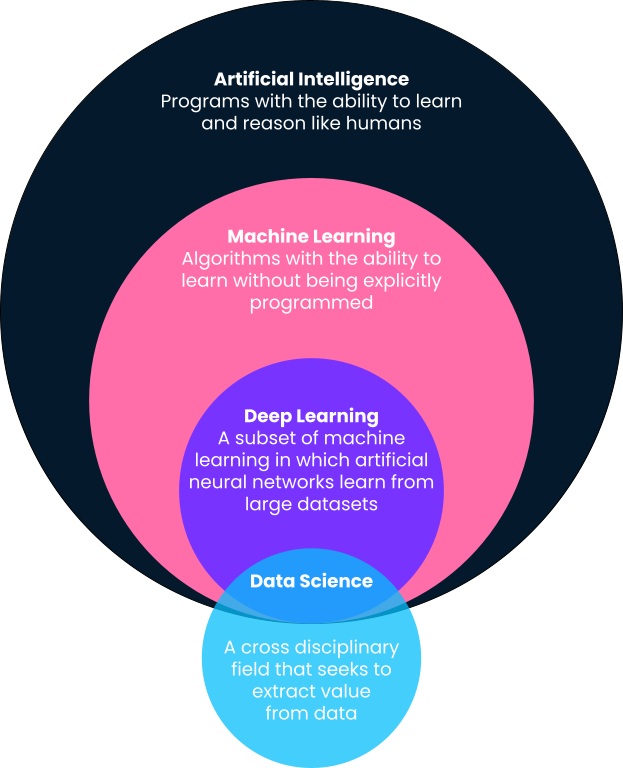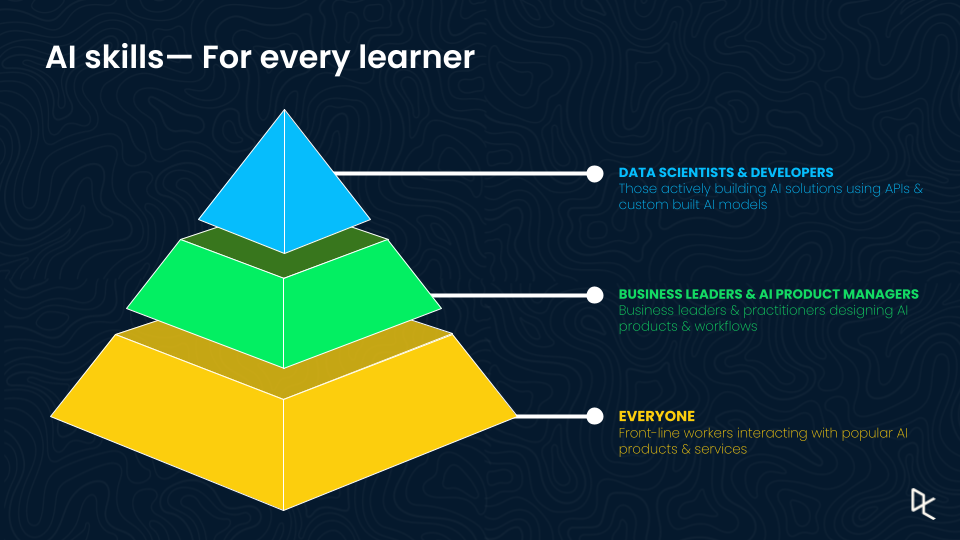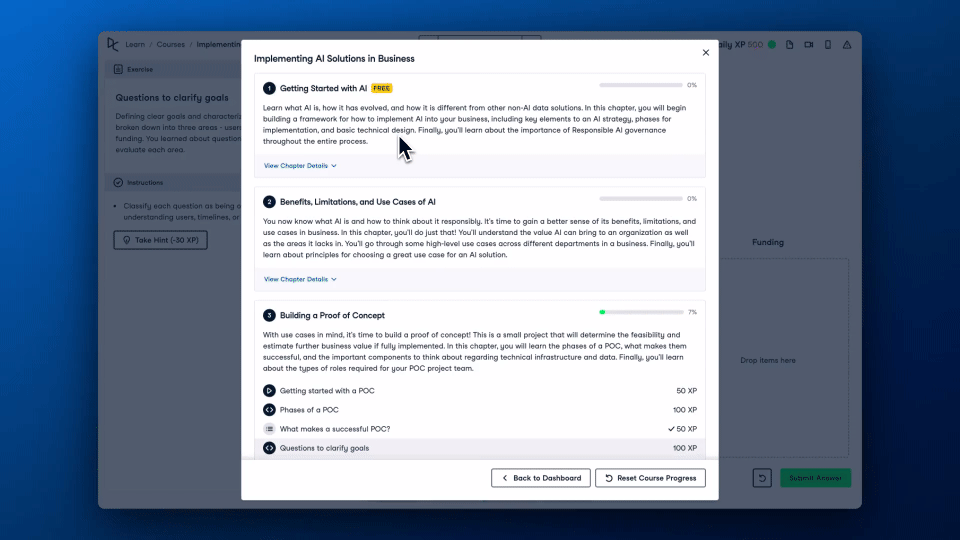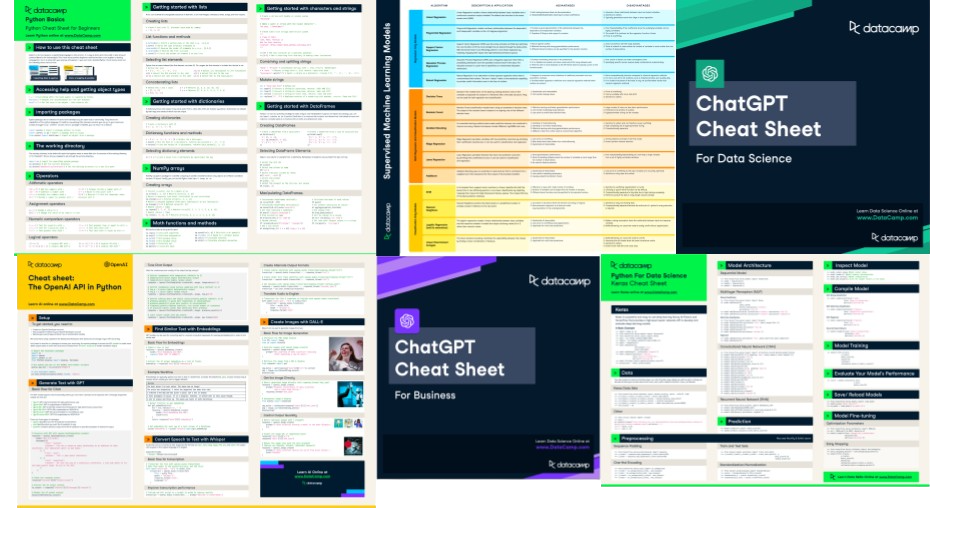Track
Artificial Intelligence (AI) has become an integral part of our daily lives, often in ways we may not even realize. From the personalized recommendations we receive on streaming platforms to the voice-activated virtual assistants that help us manage our schedules, AI is everywhere. It's in our smartphones, our cars, our workplaces, and even our homes. It's shaping industries, driving innovation, and transforming the way we interact with the world.
As AI continues to permeate every facet of our existence, a new form of literacy has emerged as a necessity - AI literacy. In an age where AI is not just a technological tool but a significant societal influencer, understanding AI goes beyond the realm of computer scientists and data analysts. It is becoming increasingly crucial for everyone.
AI literacy is not about turning everyone into an AI specialist. Instead, it's about equipping individuals with the knowledge and skills to understand, use, and interact with AI responsibly and effectively. It's about enabling people to make informed decisions about AI technologies, understand their implications, and navigate the ethical considerations they present.
In this article, we will delve into the concept of AI literacy, exploring its various components, its role in business and education, and its importance in our increasingly AI-driven world. Whether you're a data science student, a teacher, an entrepreneur, or simply a curious mind, this guide aims to shed light on what it means to be AI literate in the 21st century.
You can also learn more about the impact of AI across organizations with our webinar, The Learning Leader's Guide to AI Literacy.
Empower Your Team with AI Literacy
Build an AI-literate workforce with DataCamp for Business. Access diverse courses, hands-on projects, and centralized insights for teams of 2 or more.

What is AI Literacy?
AI literacy is a multifaceted concept that goes beyond a mere understanding of AI technologies. At its core, AI literacy involves the having the skills and competencies required to use AI technologies and applications effectively.
It's about viewing these technologies critically, understanding their context, and questioning their design and implementation. It's also about being able to discern the benefits and challenges of AI while making informed decisions about its use.
While the term 'AI literacy' might suggest a focus on computer science, its relevance extends beyond this field. In our increasingly interconnected world, AI has found applications in diverse sectors, from healthcare and finance to education and entertainment. Whether it's using AI-powered tools for data analysis in business, leveraging machine learning algorithms in healthcare diagnostics, or understanding the role of AI in personalized learning experiences, AI literacy is becoming a crucial skill in various professional fields.
But AI literacy isn't only about professional competence. It's also about critical thinking and understanding the world around us. As AI systems become more prevalent, they are influencing our social, cultural, and political interactions. Understanding these impacts and being confident in navigating an AI-driven world is central to AI literacy.

We’ve already seen tools like ChatGPT and Midjourney shape our perceptions, our decisions, and our interactions with the world. AI literacy, therefore, involves understanding these influences, recognizing the ethical, cultural, and social issues that AI brings to the fore, such as misinformation and bias. You can read more about the ethics of generative AI in a separate article.
In essence, AI literacy is about empowering individuals to navigate the AI-infused world confidently and responsibly. It's about fostering a society that can harness the benefits of AI while being mindful of its challenges and implications.
Why is AI Literacy Important?
AI is all around us, and its presence is only likely to grow over the coming years. This reason alone is enough to make the case for AI literacy. However, it’s not the only one.
A recent study by Pew Research surveyed over 10,000 adults in the US. They provided respondents with six examples of technology that is powered by AI, including smart watches, chatbots, security cameras, and email services. Only 30% of those surveyed knew AI powered all six examples.
That same study found that 27% of Americans say they interact with AI at least several times a day. However, based on the amount of technology that uses AI, the number is likely to be higher.
Similarly, an IBM study in 2022 found that 35% of organizations reported that they were using artificial intelligence technology in their businesses, with 42% saying they were looking into AI and its benefits.
Whether we know it (or like it) or not, AI plays a significant role in our lives already. AI literacy is important because it gives us the skills to identify the technology in use, work with it effectively, and know its potential and limitations.
The Components of AI Literacy
AI literacy is a broad concept that encompasses several key components. There are levels of fluency here, as we saw with data literacy, and it’s not just a binary. However, there are several areas where you can develop your understanding, across the technical, practical, and ethical aspects of AI.
Technical understanding
This involves understanding the basic principles of how AI works. It includes knowledge of how AI systems perceive the world, collect and process data, and make decisions or recommendations.
It's about understanding the capabilities of AI, such as pattern recognition, machine learning, and natural language processing, as well as its limitations.
For instance, recognizing that AI systems are only as good as the data they are trained on, and that they can make errors or be influenced by biases present in the training data.
Our Machine Learning Scientist with Python career track covers many of the basic technical aspects you’ll need to develop your understanding of AI.
Practical understanding
This aspect involves knowing how to interact effectively with AI systems and understanding their practical applications.
It's about being able to use AI tools effectively, whether it's using a voice-activated virtual assistant, interacting with an AI-powered customer service bot, or using AI-powered analytics tools in a business context.
It's also about understanding the role of AI in various sectors and how it's shaping these sectors. Check out our article on how AI is used in manufacturing to gain a glimpse of modern applications of AI.
Ethical understanding
AI is not just a technical tool; it's a technology that has profound societal implications. An ethical understanding of AI involves recognizing these implications and understanding the ethical considerations they raise. This includes understanding how biases can be embedded in AI systems and how these can perpetuate discriminatory practices.
It also involves understanding the privacy implications of AI, the potential for misuse, and the need for transparency and accountability in AI systems.
We have a guide on the ethics of generative AI, as well as a course dedicated to AI ethics, which can help you navigate the waters of today’s AI systems.
Together, these components provide a comprehensive understanding of AI, enabling individuals to use AI tools effectively, understand their implications, and navigate the ethical considerations they present.
AI Literacy in Business
In the rapidly evolving business landscape, AI literacy has emerged as a critical competency. As AI technologies continue to revolutionize various business functions, understanding AI is fast becoming a necessity for professionals across all levels and departments.

AI literacy is relevant across organizations
The role of AI literacy in business
AI literacy in business is about understanding how AI technologies can be leveraged to drive efficiency, innovation, and strategic advantage. It involves understanding how AI can be used in areas like customer service, marketing, human resources, supply chain management, and decision-making. It's about recognizing the potential of AI to transform business models, create new value propositions, and reshape industries.
In our course, Implementing AI Solutions in Business, we explore how organizations can extract value from AI, spot opportunities, and develop an AI strategy.
The importance of hands-on experience
Just like in education, hands-on experience and real-world applications are crucial in understanding AI in a business context. This could involve using AI-powered business analytics tools, implementing AI in business processes, or exploring case studies of how businesses have successfully leveraged AI.
Such experiences help professionals understand the practical applications of AI, see its impact on business outcomes, and grasp its strategic implications.
You can read more about some of the top AI tools for boosting your workflow in a separate article, which explores how you can leverage AI in data science tasks within your business.

Hands-on learning from DataCamp
The need for continuous learning and upskilling
The field of AI is constantly evolving, with new technologies, applications, and implications emerging regularly. This makes continuous learning and up-skilling essential for professionals. Businesses need to invest in training and development programs to ensure their employees stay up-to-date with the latest AI trends, technologies, and best practices.
Our AI Fundamentals skill track helps you and your organization build a strong foundation with AI, helping you gain actionable knowledge on some of the trending topics in the AI landscape today, such as large language models and generative AI.
Ethical and societal considerations
AI literacy in business also involves understanding the ethical and societal considerations of AI. This includes understanding how biases can be embedded in AI systems, the privacy implications of AI, and the need for transparency and accountability in AI applications. Businesses need to consider these factors when implementing AI, both to mitigate risks and to build trust with customers, employees, and stakeholders.
You can explore the topic of AI ethics in more detail in our course, which looks at some key principles, as well as fairness, bias reduction, and trust in AI design.
AI literacy is becoming a critical competency in the business world, enabling professionals to leverage AI technologies effectively, make informed decisions about AI implementation, and navigate the ethical and societal implications of AI.
AI Literacy in Education
As AI continues to permeate various aspects of our lives, its integration into the education system has become inevitable. AI literacy must play a crucial role in primary and secondary education to prepare students for a future where AI will be a fundamental part of their personal and professional lives.
The role of AI literacy in education
AI literacy is not just an additional subject; it's a critical component of a comprehensive education in the 21st century. It helps students understand the world around them, equipping them with the knowledge and skills they need to navigate an increasingly AI-driven society. It fosters critical thinking, problem-solving, and digital literacy skills, preparing students for a wide range of careers and life scenarios.
However, despite the clear need for education on this topic, one literature review on AI literacy found that the teaching of basic AI-related concepts and techniques at the K-12 level is scarce.
The importance of hands-on learning
Teaching AI literacy is not just about imparting theoretical knowledge; it's about providing hands-on learning experiences and real-world examples.
This could involve activities like programming a simple AI model, exploring how AI is used in various industries, or discussing the ethical implications of AI in real-world scenarios. Many of these topics are covered in our AI Fundamentals skill track.
Such experiences help students understand the practical applications of AI, see its impact on society, and grasp its ethical implications.
Indeed, the literature review we cited above suggests that in teaching AI, an exploratory education should be adopted, which integrates science, computer science, and integral practice. However, few current learning experiences assess whether students truly understand AI concepts post-learning.
The need for teacher training in AI and ML education
To effectively teach AI literacy, educators themselves need to be AI literate. This process involves understanding the basics of AI and machine learning, being able to explain these concepts in an accessible way, and understanding the ethical and societal implications of AI.
Teacher training in AI and ML education is therefore crucial. It equips teachers with the knowledge and skills they need to integrate AI literacy into their teaching and to guide their students in exploring the world of AI.
Similarly, a competency framework is essential to guide educational institutions in designing didactic proposals. According to researchers in the field, such a curriculum should reflect sequence and academic continuity and be modular, personalized, and adaptable to school conditions.
Furthermore, AI literacy can enhance the learning of core subjects if integrated into the teaching process, especially if the curriculum is co-designed with teachers.

AI cheat sheets can help with AI literacy
How to Develop AI Literacy in Organizations
As AI continues to revolutionize the business landscape, developing AI literacy within organizations has become a strategic imperative. Here are some key steps organizations can take to foster AI literacy:
Start with leadership commitment
The first step towards developing AI literacy in an organization is commitment from the top. Leaders need to recognize the importance of AI literacy and commit resources towards its development. This includes investing in training programs, creating a culture of continuous learning, and integrating AI literacy into the organization's strategic objectives.
Introduce training and development programs
Organizations should invest in comprehensive training and development programs to enhance AI literacy among their employees. These programs should cover the basics of AI, its applications in the business context, and its ethical and societal implications. They should also provide hands-on learning experiences, allowing employees to interact with AI technologies and see their practical applications.
DataCamp for Business is one such option, which can help organizations build confidence and AI skills through active learning. It provides a hands-on approach to learning and allows for tailored curriculums that suit your business needs.
Get started with DataCamp for Business
Build a data-driven workforce with DataCamp for business

Focus on cross-functional learning
AI literacy should not be confined to the IT department. It's important for professionals across all departments and levels to understand AI and its implications. Cross-functional learning initiatives, such as workshops, seminars, and collaborative projects, can help spread AI literacy across the organization.
In our State of Data Literacy Report, we found that 85% of respondents agreed that organizations must invest in life-long learning for their workforce to adapt to the new era of data literacy. However, only 14% of leaders claimed that employees outside of data roles receive data training.
Clearly, there is a disconnect between what is needed and what is being provided. Those who can expedite the transformation to cross-functional learning are likely to get ahead of the curve when it comes to AI literacy.
Apply it to business use cases
Learning about AI through real-world applications can make it more tangible and relevant. Organizations can facilitate this by implementing AI technologies in their operations and involving employees in the process. This could involve using AI-powered analytics tools, implementing AI in customer service, or exploring AI applications in product development.
You can learn more about the use cases of machine learning and AI in a separate article, which explores some of the common algorithms and how they’re used.
Account for ethical considerations
Developing AI literacy also involves understanding the ethical considerations of AI. Organizations should foster a culture of ethical AI use, educating employees about the ethical implications of AI, such as bias, privacy, and transparency, and encouraging ethical decision-making in AI implementation.
We cover the concept of responsible AI in a separate blog post, which looks at some of the biases in AI algorithms and how we can mitigate them.
Ensure continuous learning
The field of AI is constantly evolving, making continuous learning essential. Organizations should encourage employees to stay up-to-date with the latest AI trends, technologies, and best practices, providing resources and opportunities for continuous learning and up-skilling.
The Future of AI Literacy
As we look towards the future, the importance of AI literacy is set to grow exponentially. With AI technologies evolving at a rapid pace and their applications expanding across various sectors, AI literacy will continue to be a critical skill for individuals, businesses, and societies.
The evolving nature of AI literacy
AI literacy is not a static concept; it evolves with the advancement of AI technologies. We’ve recently seen this with generative AI and its impact on creativity, for example.
As AI becomes more sophisticated and its applications more diverse, the definition of AI literacy will continue to expand. It will involve understanding new AI technologies, their applications, and their implications. Continuous learning and adaptability will be key to staying AI literate in the future.
Another good example is understanding large language models (LLMs) and how they work.
Future careers and responsible citizenship
As AI continues to transform the job market, AI literacy will become a critical skill for a wide range of careers, not just those in technology. It will be important for professionals in fields like healthcare, finance, marketing, and more. We explored the top data science jobs of the future in a separate article, which features several AI roles.
Moreover, as AI continues to influence our society and culture, AI literacy will be crucial for responsible citizenship. It will enable individuals to make informed decisions about AI, understand its societal implications, and participate in discussions about AI policy and regulation.
Shaping the future of AI technology
AI literacy is not just about understanding AI; it's also about shaping the future of AI. An AI-literate society can contribute to the development of AI technologies that are ethical, transparent, and beneficial for all. It can ensure that AI technologies are designed and used in a way that respects human rights, promotes fairness, and benefits society.
The future of AI literacy is dynamic, expansive, and crucial for our collective future. As we navigate this exciting frontier, AI literacy will be our compass, guiding us toward a future where AI is used responsibly, ethically, and to the benefit of all.
Final Thoughts
In our journey through the landscape of AI literacy, we've explored its various facets, its role in education and business, and its importance in our increasingly AI-driven world. We've seen how AI literacy extends beyond a technical understanding of AI, encompassing ethical considerations, practical applications, and societal implications. We've recognized its importance in various fields, not just computer science, and its role in critical thinking and understanding the world around us.
As AI continues to evolve and permeate every aspect of our lives, the importance of AI literacy cannot be overstated. It is a critical skill for the 21st century, equipping individuals to navigate an increasingly AI-infused world, make informed decisions about AI technologies, and contribute to the responsible and ethical development of AI.
But the journey of AI literacy is not a destination; it's a continuous path of learning and exploration. As AI technologies continue to evolve, so too will our understanding of them. The field of AI is vast and exciting, filled with opportunities for innovation, discovery, and growth. So, let's keep learning, keep exploring, and keep pushing the boundaries of what's possible with AI.
To get started, check out our guide on how to learn AI, which details everything you need to know about starting your journey to AI literacy.

A senior editor in the AI and edtech space. Committed to exploring data and AI trends.
